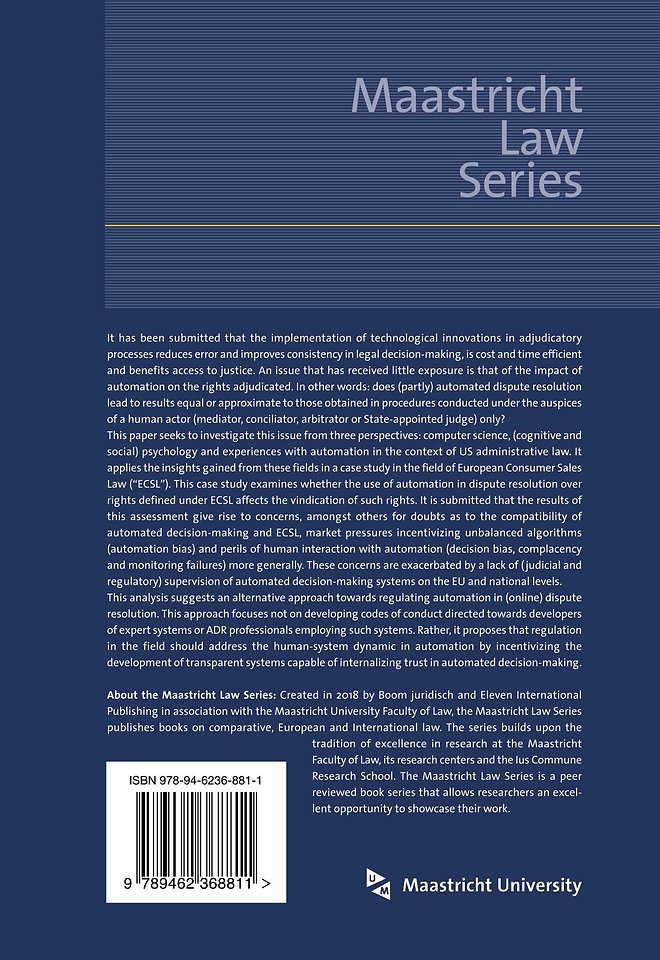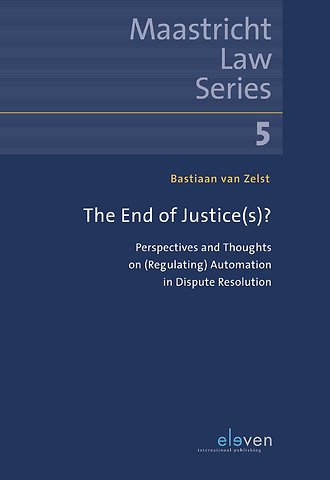



Prof. Bastiaan van Zelst LLm LLm PhD (1981) holds the chair in Dispute Resolution and Arbitration at Maastricht University.
Meer over Bas van ZelstThe End of Justice(s)?
Perspectives and thoughts on (regulating) automation in dispute resolution (PDF-Download)
Samenvatting
It has been submitted that the implementation of technological innovations in adjudicatory processes reduces error and improves consistency in legal decision-making, is cost and time efficient and benefits access to justice. An issue that has received little exposure is that of the impact of automation on the rights adjudicated. In other words: does (partly) automated dispute resolution lead to results equal or approximate to those obtained in procedures conducted under the auspices of a human actor (mediator, conciliator, arbitrator or State-appointed judge) only?
This paper seeks to investigate this issue from three perspectives: computer science, (cognitive and social) psychology and experiences with automation in the context of US administrative law. It applies the insights gained from these fields in a case study in the field of European Consumer Sales Law (“ECSL”). This case study examines whether the use of automation in dispute resolution over rights defined under ECSL affects the vindication of such rights. It is submitted that the results of this assessment give rise to concerns, amongst others for doubts as to the compatibility of automated decision-making and ECSL, market pressures incentivizing unbalanced algorithms (automation bias) and perils of human interaction with automation (decision bias, complacency and monitoring failures) more generally. These concerns are exacerbated by a lack of (judicial and regulatory) supervision of automated decision-making systems on the EU and national levels.
This analysis suggests an alternative approach towards regulating automation in (online) dispute resolution. This approach focuses not on developing codes of conduct directed towards developers of expert systems or ADR professionals employing such systems. Rather, it proposes that regulation in the field should address the human-system dynamic in automation by incentivizing the development of transparent systems capable of internalizing trust in automated decision-making.
Trefwoorden
Specificaties
Inhoudsopgave
1 Introduction 9
2 Automation in online dispute resolution 13
2.1 History and features of ODR platforms 14
2.2 Future developments 16
2.3 Conclusion 18
3 Digitization in State courts 19
3.1 The British Columbia (Canada) Experience 19
3.2 E-Justice and Innovation in the EU Context 20
3.3 Conclusion 21
4 Perspectives from computer science 23
4.1 Jurisprudential challenges 24
4.2 Technical challenges 26
4.3 Political challenges 26
5 Perspectives from the social sciences 29
5.1 The human factor in automation 30
5.2 The relevance of procedural fairness 31
6 Experiences in (US) administrative law 35
7 European Consumer Sales Law (ECSL) 37
7.1 The legislative basis for ECSL 37
7.2 Modes of regulation in ECSL: from rules to circumstances 38
7.3 Enforcement of ECSL 40
7.4 ODR in Europe 42
8 Automation in dispute resolution and the effective application of ECSL 47
8.1 Are legal expert systems fit to assess ECSL? 48
8.2 Concerns over neutrality and transparency 48
8.3 Concerns with respect to judicial and regulatory oversight 49
8.4 Is automated dispute resolution a threat to effective judicial protection? 50
9 From trusting institutions to understanding decisions 51
Anderen die dit e-book kochten, kochten ook
Rubrieken
- cadeauboeken
- computer en informatica
- economie
- filosofie
- flora en fauna
- geneeskunde
- geschiedenis
- gezondheid
- jeugd
- juridisch
- koken en eten
- kunst en cultuur
- literatuur en romans
- mens en maatschappij
- naslagwerken
- non-fictie informatief/professioneel
- paramedisch
- psychologie
- reizen
- religie
- schoolboeken
- spiritualiteit
- sport, hobby, lifestyle
- thrillers en spanning
- wetenschap en techniek
- woordenboeken en taal





